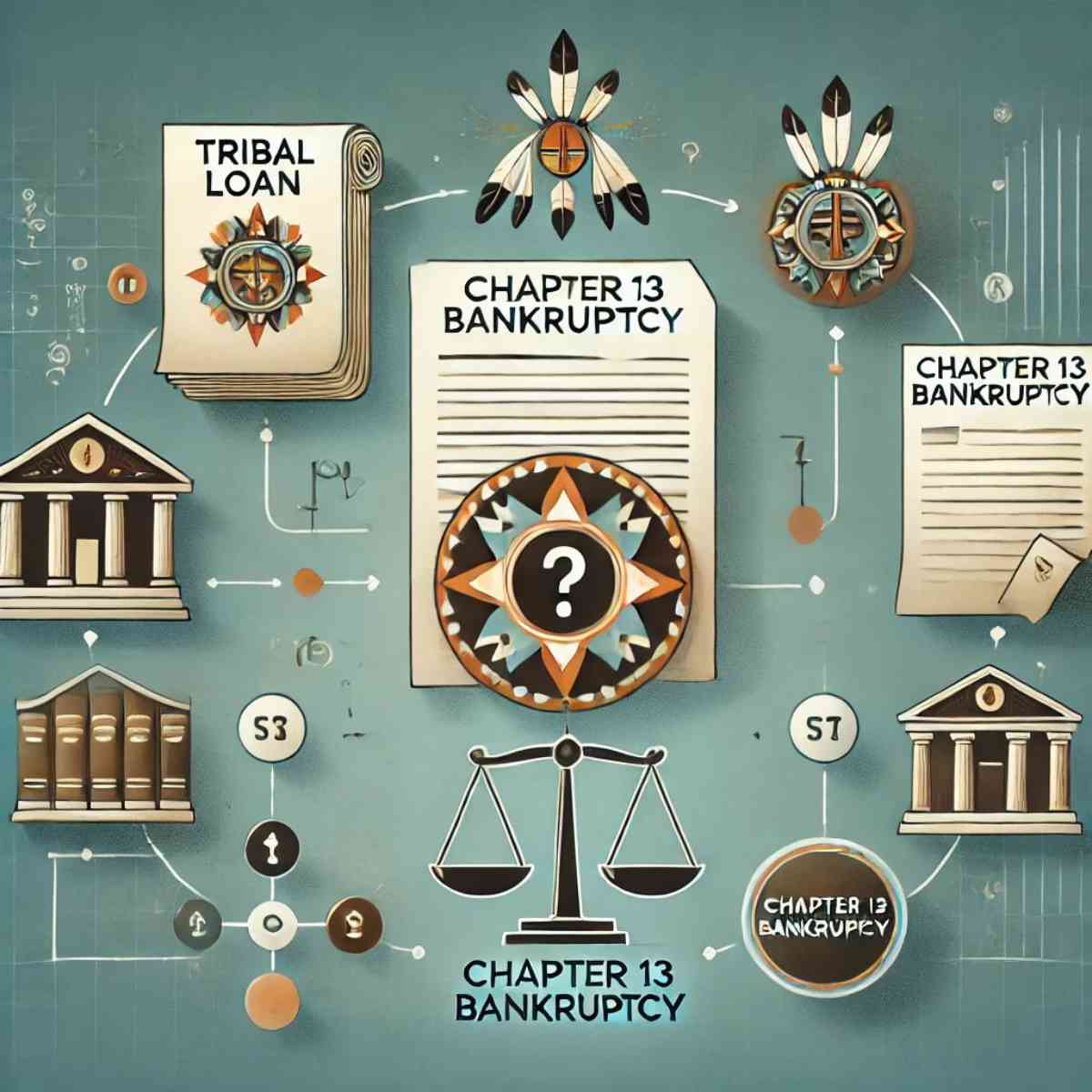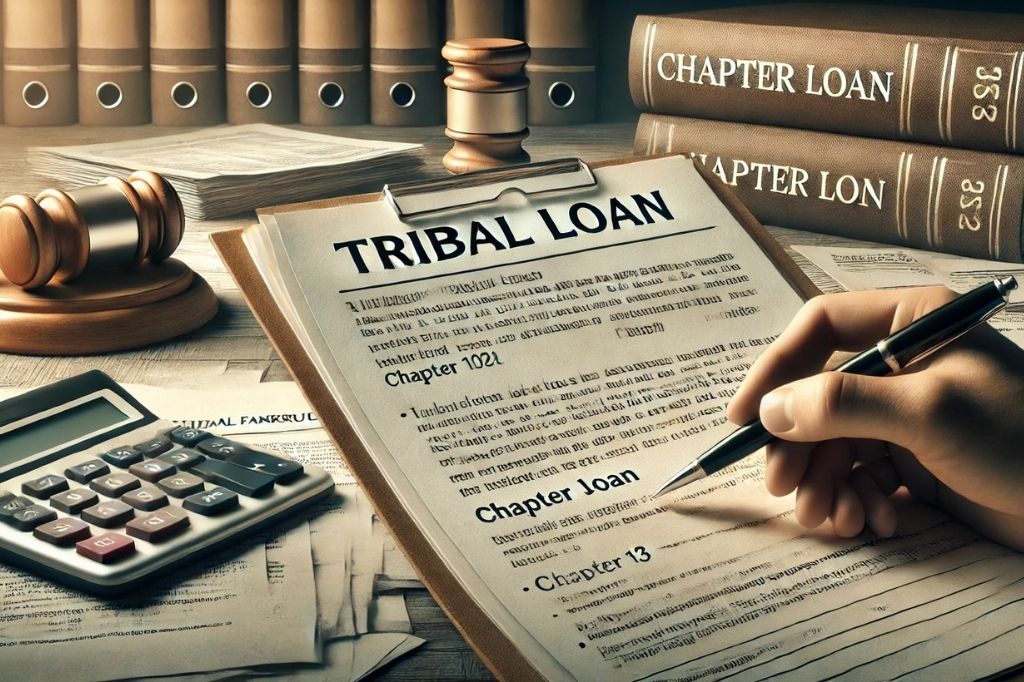Confronting monetary hardships and taking into account Chapter 13 liquidation can be overpowering, particularly when you have different sorts of obligations, including tribal loans. The inquiry are tribal loans discharged in Chapter 13 is basic for anybody who has taken out a tribal credit and is curious as to whether liquidation can help wipe out or pay off this obligation. In this article, we’ll dive into the special lawful difficulties encompassing tribal loans, how Chapter 13 liquidation works, and whether it can offer alleviation for borrowers with tribal loans.
Let’s separate this complicated issue to assist you with arriving at informed conclusions about your monetary future.
Understanding Tribal Loans
Tribal loans are private loans presented by banks that depend on Local American reservations and work under tribal regulation. Since these loans are given by tribal substances, they are many times subject to unexpected principles in comparison to standard loans, particularly with regards to financing costs and reimbursement terms. Numerous tribal moneylenders promote speedy endorsement and quick subsidizing, making them interesting to people who need prompt monetary help and may not meet all requirements for conventional loans.
In any case, tribal loans can accompany exorbitant financing costs and charges, at times making them trying to reimburse. Tribal banks guarantee resistance under tribal power, and that implies they are not really limited by state regulations overseeing financing costs or credit terms. This sway can make lawful ill defined situations, making it challenging for borrowers to comprehend their freedoms and the loan specialist’s commitments completely. Understanding how tribal loans function is essential while deciding whether these loans can be remembered for an insolvency documenting or on the other hand on the off chance that they work beyond common lawful designs.
Given the special status of tribal loans, people considering insolvency frequently keep thinking about whether they can release or rearrange this kind of obligation under Chapter 13. Investigating how chapter 11 regulation associates with tribal sway is a fundamental stage in addressing this inquiry.

How Chapter 13 Insolvency Works?
Chapter 13 insolvency is intended to assist people with redesigning their obligations and lay out a sensible reimbursement plan. Dissimilar to Chapter 7, which includes selling resources for take care of obligations, Chapter 13 permits borrowers to hold their property while reimbursing a piece or every one of their obligations over a time of three to five years. Under this arrangement, got obligations (like a home loan or vehicle advance) are normally focused on, while uncollateralized debts, (for example, Mastercards and hospital expenses) might be decreased or discharged relying upon the singular’s reimbursement capacity.
The essential objective of Chapter 13 is to give debt holders a new beginning by making a reasonable arrangement that permits them to address remarkable obligations without overpowering monetary strain. When the reimbursement plan is finished, certain leftover debts without collateral might be discharged. Be that as it may, Chapter 13 has explicit prerequisites, and not all obligations fit the bill for release or decrease. Understanding the idea of your debts is fundamental while petitioning for Chapter 13, as it will affect which obligations are incorporated and the way that they are treated under the reimbursement plan.
Given the organized idea of Chapter 13, many individuals keep thinking about whether tribal loans fall into similar classes as other uncollateralized debts and in the event that they can be discharged or remembered for the reimbursement plan.
Related Article: https://triballoansweb.com/tribal-loans-class-action-lawsuit/
The Complex Connection Between Tribal Loans and Chapter 11 Law
The essential test with tribal loans in chapter 11 stems from the issue of tribal power. Tribal moneylenders frequently work under the legitimate insurances of their sovereign status, meaning they are not be guaranteed to expose to government or state regulations overseeing advance practices. This power can convolute issues while endeavoring to remember a tribal credit for a Chapter 13 insolvency recording.
Under U.S. liquidation regulation, most uncollateralized debts can be remembered for Chapter 13 reimbursement plans, with potential for release toward the finish of the reimbursement time frame. Nonetheless, on the grounds that tribal loans are represented by tribal regulation, they may not be dealt with the same way as other uncollateralized debts. Tribal power successfully limits the compass of U.S. chapter 11 courts over these loans, as tribal moneylenders might contend that they are invulnerable to government regulations, including those connected with insolvency.
Because of this resistance, borrowers might confront moves in endeavoring to release or rearrange tribal loans through Chapter 13. While each case might differ, borrowers genuinely should comprehend the conceivable lawful obstacles included and talk with a liquidation lawyer experienced in tribal credit cases for explicit guidance.
Can Tribal Loans Be Remembered for a Chapter 13 Reimbursement Plan?
In principle, Chapter 13 is expected to cover all debts without collateral in a borrower’s reimbursement plan, however whether this incorporates tribal loans relies generally upon the singular bank’s position. A few tribal moneylenders might permit the credit to be incorporated, while others might challenge their consideration in light of sway claims.
For borrowers, this implies that endeavoring to remember a tribal credit for a Chapter 13 arrangement might include extra legitimate advances. Liquidation courts might not have the power to force tribal loan specialists to stick to a reimbursement or release plan because of the moneylender’s safeguarded lawful status. At times, tribal loan specialists might work with the borrower outside the liquidation cycle, however this isn’t ensured.
Approaching tribal moneylenders directly for a potential reimbursement change might be a choice, however achievement fluctuates generally by bank. At last, the consideration of tribal loans in a Chapter 13 arrangement is mind boggling and reliant upon individual moneylender participation, making it fundamental for borrowers to look for direction from a legitimate proficient learned in both liquidation and tribal regulation.
What Happens to Tribal Loans Assuming They’re Prohibited from Chapter 13?
In the event that a tribal credit can’t be remembered for a Chapter 13 liquidation plan, the borrower is as yet answerable for reimbursing it beyond the chapter 11 cycle. This implies the borrower should keep making installments as per the first credit terms, which can introduce a monetary strain in the event that different obligations are likewise being reimbursed under the Chapter 13 plan.
Barring a tribal credit from Chapter 13 can influence the viability of the insolvency recording, as it restricts the help accessible to the borrower. Having to deal with various reimbursement obligations can make monetary difficulties, particularly in the event that the tribal credit conveys an exorbitant loan cost. Borrowers ought to be ready to address the tribal advance freely, which might include haggling with the moneylender straightforwardly or looking for elective reimbursement choices.
While it tends to be baffling, understanding that specific loans may not be discharged or diminished in Chapter 13 can assist borrowers with arranging their funds all the more really and keep away from extra obligation troubles.
Legal Guidance for Borrowers with Tribal Loans in Chapter 13
Given the legitimate intricacies encompassing tribal loans in chapter 11, counseling a liquidation lawyer with experience in tribal regulation is enthusiastically suggested. These experts can give significant knowledge into whether a particular tribal credit might be remembered for a Chapter 13 arrangement and prompt on expected other options in the event that the credit is rejected.
A proficient lawyer can likewise assist you explore exchanges with the moneylender, possibly prompting changed terms or reimbursement plans beyond the insolvency cycle. Working with an attorney guarantees that your freedoms are secured and that you get the most dependable direction in view of current legitimate principles.
Each tribal moneylender works in an unexpected way, and having proficient direction can have a tremendous effect in figuring out your choices and coming to informed conclusions about your monetary future.
Alternatives for Overseeing Tribal Loans Beyond Bankruptcy
In the event that remembering a tribal credit for Chapter 13 isn’t doable, investigating elective reimbursement arrangements can assist with facilitating the monetary weight. Borrowers might consider obligation the board programs, credit guiding, or individual planning procedures to deal with their reimbursement commitments.
Moreover, a few tribal banks might be available to arranging installment terms straightforwardly, considering potential changes in light of the borrower’s monetary circumstance. Exploring each conceivable avenue can assist borrowers with diminishing pressure and find a sensible arrangement even beyond chapter 11.
By investigating these choices, borrowers can stay away from likely punishments, keep a positive relationship with the loan specialist, and work toward a goal that fits affordable enough for them.
Editor’s note…
Responding to the inquiry are tribal loans discharged in Chapter 13 isn’t direct, as the special idea of tribal loans and tribal sway make complex legitimate contemplations. While Chapter 13 liquidation offers huge obligation alleviation for some sorts of debt without collateral, tribal loans frequently stand outside these securities, expecting borrowers to make extra strides assuming they wish to address them.
For people with tribal loans, understanding the restrictions and looking for proficient lawful guidance can give clearness and assist with deciding the best game-plan. Albeit tribal loans might introduce exceptional difficulties, borrowers actually have choices, whether through direct exchange with the moneylender or investigating elective reimbursement methodologies.
In the end, cautious preparation, consciousness of lawful privileges, and master direction are fundamental for exploring the intricacies of tribal loans inside the setting of Chapter 13 bankruptcy.

